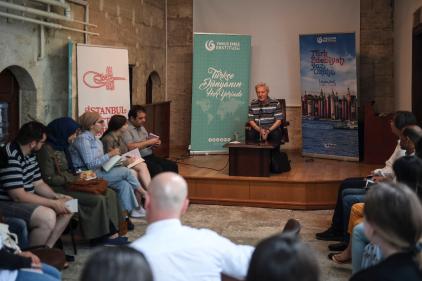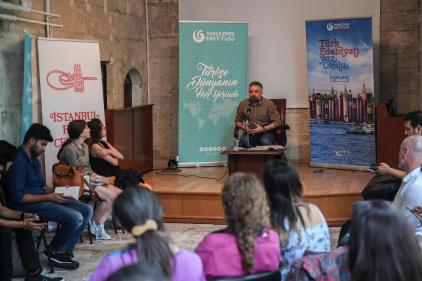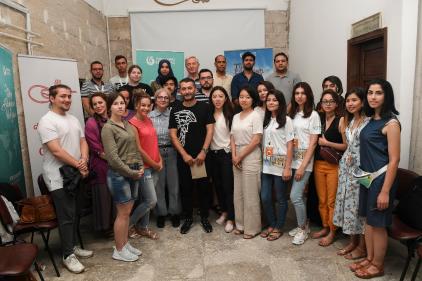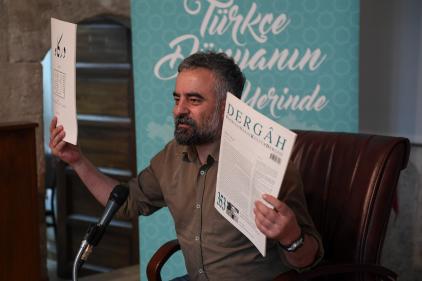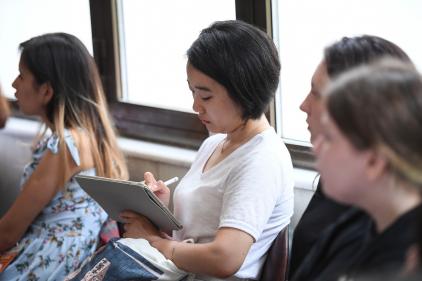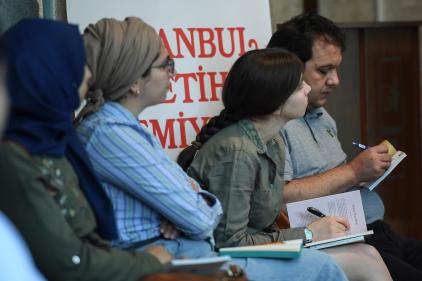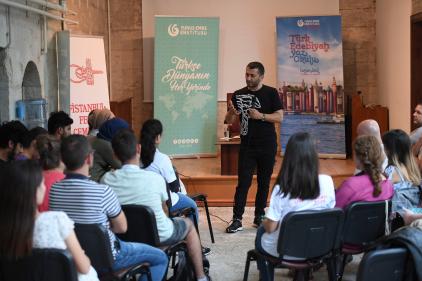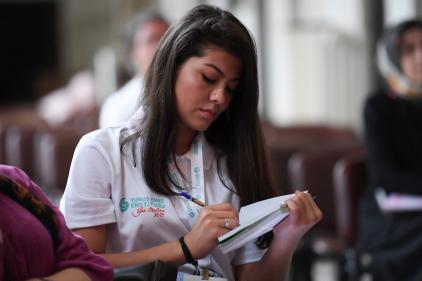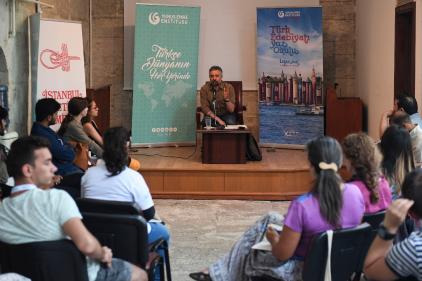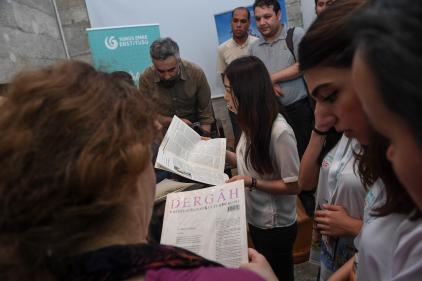"One must know Yahya Kemal in order to know Turkish literature"
Researcher and writer Beşir Ayvazoğlu has given a lecture entitled "The Man Who Came Home: Yahya Kemal" as part of the 2019 Turkish Literature Summer School, organized by Yunus Emre Institute (YEE).
The third day of the Turkish Literature Summer School had the lecture entitled "The Man Who Came Home: Yahya Kemal," given by Cultural Historian and Aesthete Beşir Ayvazoğlu at the Istanbul Conquest Association.
Ayvazoğlu talked about Yahya Kemal and described the period in which he lived. "Knowledge of Yahya Kemal is essential to understand Turkish literature, especially for those foreigners who work on Turkish literature," he said.
Addressing the students who are visiting Istanbul, Ayvazoğlu pointed out that it is crucial for them to realize that Yahya Kemal is one of the first things that come to mind when a reference to Istanbul is made. "Yahya Kemal is, first and foremost, a poet of Istanbul. At the same time, he is a forerunner of Turkish modern poetry, a poet who made significant contribution to the formation of this poetry," he said.
Ayvazoğlu noted that Yunus Emre Institute is an important institute. "As you know, the Spanish have their Cervantes Institute and the German their Goethe Institute. Yunus Emre Institute provided significant facilities for those who want to learn Turkish. At the same time, the scholars who work on Turkey tend to visit its branches abroad. Therefore, I see it as an important effort for YEE to bring the young academics working on Turkish culture and literature to Turkey and ensure that they learn more about Istanbul and meet intellectual and writers living in Istanbul," he said.
"The history to which Yahya Kemal returned upon coming home is the history in which he listened to Tanburi Cemil Bey"
Ayvazoğlu described Yahya Kemal's life and his return to Istanbul after staying in Paris for a while, noting that Yahya Kemal was very fond of music in addition to his passion for poetry.
Ayvazoğlu indicated that Yahya Kemal was the only Turkish intellectual who did not develop a liking for the western music even if he visited Europe. "Upon visiting Paris or other places in Europe, the Young Turks would admire European composers and western music and when they returned home, they would denigrate their own music. This did not apply to Yahya Kemal. When he was visiting Paris, he would frequently remember the calls to prayer he had listened to back in Skopje or the hymns he had heard from his mother. The musical circles he attended after he came back to Istanbul were very significant," he said.
Ayvazoğlu explained that Yahya Kemal came to be famous with his new poetic style and approach, and his friends wanted him to stay in Istanbul and lead them, and, to this end, they introduced him to Tanburi Cemil Bey.
He indicated that Yahya Kemal met Tanburi Cemil Bey at one of his friends' house and Yahya Kemal became a fan of Tanburi Cemil Bey. "Upon listening to Cemil Bey, a golden door has opened before me, and I stepped into the world of our own culture," Ayvazoğlu reported Yahya Kemal as saying, referring to this encounter. Ayvazoğlu noted that the history to which Yahya Kemal returned upon coming home was the history in which he listened to Tanburi Cemil Bey.
"It is impossible to think about Istanbul without remembering Yahya Kemal"
Ayvazoğlu argued that it is hard to imagine Dublin without Joyce or Saint Petersburg without Dostoevsky or Paris without Balzac. "Likewise, Yahya Kemal is so intricately identified with Istanbul that it is impossible to think about Istanbul without remembering Yahya Kemal," he said.
Ayvazoğlu drew attention to the fact that Yahya Kemal placed Istanbul at the very center of his philosophy and he was a poet who interpreted the entire Turkish history and culture with reference to Istanbul. "With the metaphor 'home' in the phrase 'the man who came home', I refer to Istanbul. This is because in Yahya Kemal's thought, Istanbul was a city which summed up the entire Ottoman Empire, and, with that, the Turkish and Islamic culture," he said.
Following the interview conducted in a sincere atmosphere with the attendants of the Turkish Literature Summer School, Ayvazoğlu answered questions from the attendants.
Ömer Erdem: "The literature of Turkish is the miracle of the Turkish nation"
Cultural Historian and Aesthete Beşir Ayvazoğlu was followed by one of the prominent poets of modern Turkish, Ömer Erdem, who talked about Istanbul in literature in his lengthy speech on "Istanbul in our Literature." Erdem described how his own artistic framework came to being and how his poetic thought was formed, stressing that he had been transformed by Istanbul. "Istanbul is an enchanting city that evolves nonstop and that never ceases to surprise you. Therefore, I find myself in this city. Istanbul is part of my personal history. And I am a living part of that history," he said.
Erdem argued that Istanbul was a constituent civilization. "After conquering Istanbul, Turks institutionalized it and dominated over the constituent thought. The empire was the product of this intellect," he said.
Erdem also read aloud passages from his poems. "The literature of Turkish is the miracle of the Turkish nation. Therefore, the poems I have written belong to Istanbul and Turkish," he added.
Ali Ayçil: "Dergah is published with the intention of developing a new literature"
Poet Ali Ayçil, the Editor-in-Chief of Dergah Journal, who wrote "Bir Japon Nasıl Ölür?" (How Does a Japanese Die?), delivered a speech entitled "Dergah: A Journal Poised between Past and Future." He indicated that Dergah was established in 1921 and since then, it has been serving Turkish literature by raising poets, writers, novelists and story tellers.
"Dergah, which started to be published in 1921, can be considered as a school that raised many important figures at that time," he said. Ayçil argued that the journal is published with the intention of developing a new literature in a new world and pointed out that the 100-years-old journal is still doing service to Turkish.
Turkish Literature Summer School-2019
The program launched by YEE to ensure that the foreign participants most of whom are attending postgraduate programs in the field of Turkology and translation learn about Turkish and Turkish literature contains seminars, courses and workshops for participants to meet prominent writers, poets and academics of the Turkish literature.
During the summer school, the participants will have a chance to study the classical and Republican era examples of Turkish literature and come together with distinguished writers and poets and learn about diverse literary genres and works through seminars, lectures and workshops.

